

Most ebook files are in PDF format, so you can easily read them using various software such as Foxit Reader or directly on the Google Chrome browser.
Some ebook files are released by publishers in other formats such as .awz, .mobi, .epub, .fb2, etc. You may need to install specific software to read these formats on mobile/PC, such as Calibre.
Please read the tutorial at this link: https://ebookbell.com/faq
We offer FREE conversion to the popular formats you request; however, this may take some time. Therefore, right after payment, please email us, and we will try to provide the service as quickly as possible.
For some exceptional file formats or broken links (if any), please refrain from opening any disputes. Instead, email us first, and we will try to assist within a maximum of 6 hours.
EbookBell Team

5.0
90 reviewsThis book provides an overview of attentional impairments in brain-damaged patients from both clinical and neuroscientific perspectives, and aims to offer a comprehensive, succinct treatment of these topics useful to both clinicians and scholars. A main focus of the book concerns left visual neglect, a dramatic but often overlooked consequence of right hemisphere damage, usually of vascular origin, but also resulting from other causes such as neurodegenerative conditions. The study of neglect offers a key to understand the brain’s functioning at the level of large-scale networks, and not only based on discrete anatomical structures. Patients are often unaware of their deficits (anosognosia), and often obstinately deny being hemiplegic. Diagnosis is important because neglect predicts poor functional outcome in stroke. Moreover, effective rehabilitation strategies are available, and there are promising possibilities for pharmacological treatments.
Attention Disorders After Right Brain Damage is aimed at clinical neurologists, medics in physical medicine and rehabilitation, clinical psychologists and neuropsychologists. It will also be useful for graduate students and medical students who wish to understand the topic of attention systems and improve their knowledge of the neurocognitive mechanisms of attentional deficits. In addition, clinical researchers in neuropsychology and cognitive neuroscience will find in this book an up to date overview of current research dealing with the attention systems of the human brain.